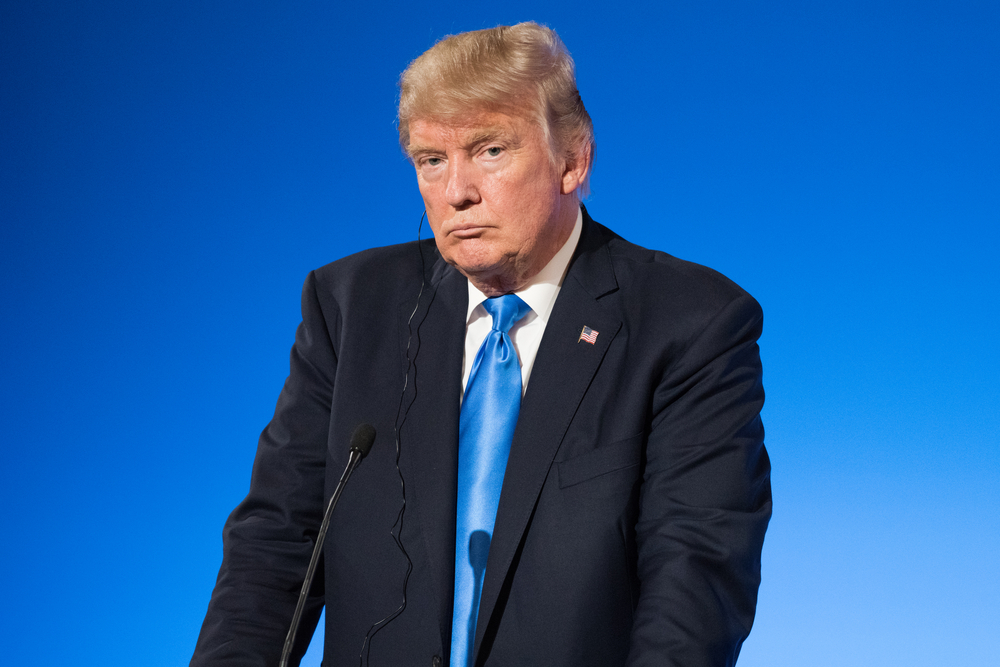American News
Trump signals support for states deciding if pot is legal

FILE: “I support Senator Gardner. I know exactly what he’s doing,” Trump told reporters in Washington, when asked about the legislation. “We’re looking at it. But I probably will end up supporting that, yes.” (Shutterstock photo)
LOS ANGELES — President Donald Trump said Friday that he was inclined to support a bipartisan effort in Congress to ease the U.S. ban on marijuana, a proposal that would dramatically reshape the nation’s legal landscape for pot users and businesses.
The federal ban that puts marijuana on the same level as LSD and heroin has created a conflict with about 30 states that have legalized pot in some form, creating a two-tiered enforcement system at the state and federal levels.
The legislation would ensure states have the right to determine the best approach to marijuana within their borders, but some U.S. restrictions would remain, including sales of non-medical pot to people under 21.
The proposal introduced Thursday has support from members of Congress from both parties, including Republican U.S. Sen. Cory Gardner of Colorado.
“I support Senator Gardner. I know exactly what he’s doing,” Trump told reporters in Washington, when asked about the legislation. “We’re looking at it. But I probably will end up supporting that, yes.”
The president’s remarks place him in conflict with his own Justice Department and Attorney General Jeff Sessions, who staunchly opposes marijuana. He lifted an Obama administration policy and freed federal prosecutors to more aggressively pursue cases in states that have legalized marijuana.
Asked about the measure in an interview with Colorado Public Radio, Sessions said, “We’ll see how far it goes and how much support there is. … My view is clear: The federal law remains in effect nationwide, just as it does for heroin and cocaine.”
The proposal’s prospects in Congress were unclear.
Gardner, who heads the Senate Republicans’ campaign arm, is close to Senate Majority Leader Mitch McConnell. The Kentucky Republican has consistently opposed legalizing marijuana but has called hemp and marijuana “two entirely separate plants.”
The bill would change the definition of marijuana in federal drug law to exclude industrial hemp, which like marijuana is part of the cannabis plant family but doesn’t contain the THC that gives pot users the high. Hemp produces the non-intoxicating cannabinoids, or CBDs, that have become a health rage and a lucrative crop in Kentucky and other states.
Oregon Democratic Rep. Earl Blumenauer, a co-sponsor, said momentum was building in the House but “we just need Republican leadership in Congress to get on board or get out of our way, and for Trump to keep his word.”
Despite his comments, Trump has sent mixed signals on the drug: While campaigning for president, he pledged to respect states that legalized marijuana, but he also has criticized legalization and implied it should be stopped.
“I don’t think anyone would make a bet on the long-term validity of an offhand remark by the president that he ‘probably’ would support something,” said Kevin A. Sabet, head of Smart Approaches to Marijuana, a nonpartisan group opposed to marijuana legalization. “I think he’ll find out soon from …
victims of marijuana addiction and impaired driving that this is not as popular as Cory Gardner is leading him to believe.”
Trump’s remarks Friday echo a promise that Gardner said he received privately from the president in April to support legislation protecting the marijuana industry in states that have legalized the drug.
“My legislation is in line with what President Trump said on the campaign and what he and I have discussed several times since he was elected,” Gardner said in a statement Friday. He welcomed the president’s “continued interest in an approach that respects the will of the voters in each state.”
Another co-sponsor of the measure, Democratic U.S. Sen. Elizabeth Warren of Massachusetts, said in a statement that Washington “needs to get out of the business of outlawing marijuana.”
California, home to one in eight Americans, launched the nation’s largest legal marijuana marketplace on Jan. 1 but thousands of businesses that have been licensed are still facing the threat of federal prosecution.
A major problem stemming from the federal ban: Major banks have been reluctant to do business with marijuana companies, fearing it could lead to prosecution.
In California, for example, paying taxes and other transactions are often done in cash, sometimes in vast amounts.
The bill includes language intended to address financial issues caused by the federal ban.
——
Associated Press writers Nicholas Riccardi in Denver, Kevin Freking in Washington and Gillian Flaccus in Portland, Oregon, contributed.





















